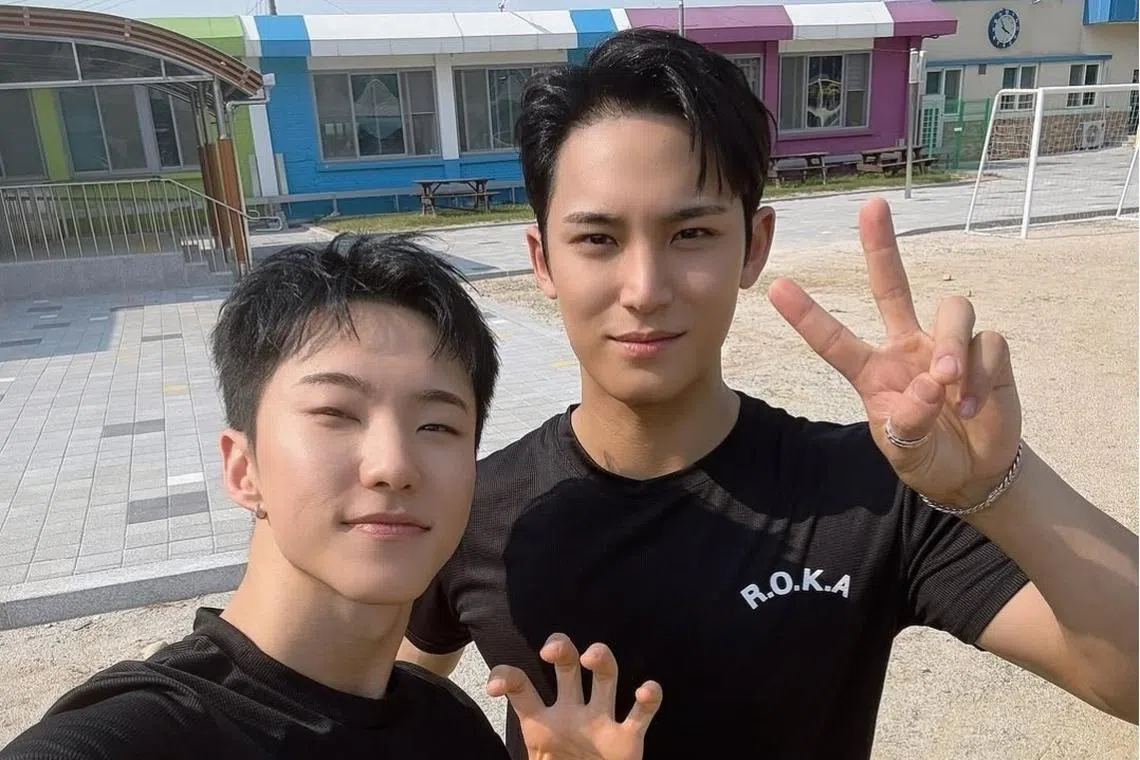Roka rising: The Korea Army T-shirt that is taking over the streets
Sign up now: Get ST's newsletters delivered to your inbox

Seventeen’s Hoshi (left) and Mingyu wear plain black T-shirts stamped with Roka, short for Republic of Korea Army, on SBS’ variety show Whenever Possible.
PHOTO: SBS
SEOUL – In South Korea, every man is required to serve in the military, usually between the ages of 18 and 28. Because of that, spotting young men in uniform or military-related clothing is nothing unusual.
What might surprise outsiders, however, is how a plain black T-shirt stamped with Roka in capital letters, which is short for Republic of Korea Army, has suddenly become one of the country’s hottest fashion staples.
Middle- and high-school students wear one to class, college students sport one on campus and even young parents dress their toddlers in one for Instagram-worthy photos.
For years, the shirt was nothing more than a functional undershirt. It is not standard issue, but since 2015, it has been officially sold on military bases by Now Corp.
In 2023, two more companies – Naramulsan and Neo Factory – began selling nearly identical versions at military stores, all priced around 10,000 won (S$9).
The unlikely rise of the Roka shirt began in the barracks. Among conscripts, it had long been nicknamed “the most comfortable shirt” in the military.
“People wore them all the time in the army, so after discharge, some of us kept wearing them. Plus, it’s cheap. It absorbs sweat well, and black goes with anything,” said Mr Yu Soo-min, 29, who still wears his nearly eight years after leaving the service. “Some even say they wear it to show they have served.”
The shirt’s transition from practical to fashionable is harder to pin down, but many credit South Korean rapper Beenzino and K-pop boy band BTS.
In 2019, Beenzino, a fashion icon and co-founder of the streetwear label IAB Studio, posted a photo of himself in a Roka tee.
In the post, he recalled mailing one to his wife, German model Stefanie Michova, while still serving.
“I had just taken it off while on leave and sent it to her in a hurry. She almost threw up when she opened the package,” he joked on Instagram. “But wearing it again now, I have to admit, it’s really comfortable.”
Michova also posted a photo of herself holding the shirt he had gifted her. Those posts did not just make the tee trendy among young men, but they also sparked a mini tradition of gifting the military shirt to loved ones, further cementing its status as more than just military gear.
BTS added fuel to the fire, according to local reports.
Fans noticed that Roka overlapped with their fandom name, Army, making the shirt especially desirable.
On top of that, male celebrities, whether during their military service or afterwards, were often photographed in the tee, giving it even more cultural cachet.
Once celebrities were spotted wearing the shirt, regular people followed.
Ms Choi, a mother in her 30s, bought one for her one-year-old son. “I think the design is adorable on babies,” she said, adding that parents often upload photos of their kids in the tee on social media.
Teenagers have embraced it too.
Kim, a 17-year-old high schooler in Yongsan, wears it because “everyone else does”. He said: “They’re cheap and great for PE class. I also like wearing it under my uniform.”
As the shirt’s popularity grew, knock-offs flooded the market, cashing in on demand.
Not every Roka tee sold online or in stores is the same as those found at military bases. Since Roka cannot be trademarked, there is nothing stopping copycats.
A fashion industry insider who declined to be named suggested that the lack of copyright protection fuelled the trend.
“Because it’s tied to the real military and was once hard to get, it carried a sense of authenticity and uniqueness that helped it take off. For Gen Z, that kind of authenticity can matter more than a brand name,” she said. “And once it gained momentum, the flood of copycat products only helped it spread further.”
Still, the shirt has its critics.
“I get that it’s cheap and comfy. I wear it myself when I work out. But seeing little kids in Hongdae wearing it feels strange. Maybe I just don’t get fashion,” said Mr Kwon Hee-do, who is in his 30s.
Online commenters have been harsher.
“In a country where soldiers get so little respect, it’s ridiculous to see their undershirts turned into a fashion item,” wrote a netizen. THE KOREA HERALD/ASIA NEWS NETWORK


